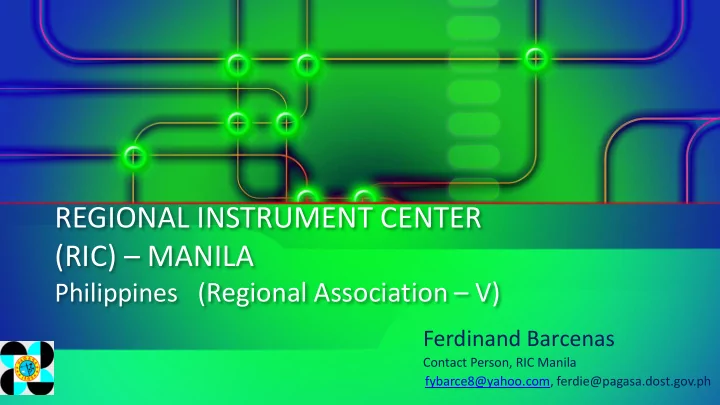

REGIONAL INSTRUMENT CENTER (RIC) – MANILA Philippines ( Regional Association – V) Ferdinand Barcenas Contact Person, RIC Manila fybarce8@yahoo.com, ferdie@pagasa.dost.gov.ph
PAGASA STRUCTURE
RIC PAGASA STRUCTURE
STRUCTURE of RIC Manila Regional Instrument Center Administrator/Manager Research & Development and Engineering &Technical Services Training Division (RDTD) / Division (ETSD) / Meteorological Hydrometeorology, Tropical Equipment, Telecomn. & Technical Meteorology and Instrument Research Services Section (METTSS) and Development Section (HTMIRDS) Instruments Research Basic Meteorological and Development Unit (IRDU) Instrument Unit (BMIU) Accurate and Operational Meteorological Instruments of Observatories/Users/Customers
On-Going Plan MANILA Tuguegarao INSTRUMENT CENTRE (Manila ) Tuguegarao Mactan Davao City City City (LIC) (LIC) (LIC) Mactan
Functions of the Main Instrument Center • Serve as the center for the national reference standard for basic meteorological instrument of the agency.
Functions of the Main Instrument Center • Keep a set of meteorological standard instruments traceable with recognized international or national standards
TRACEABILITY OF OUR STANDARD INSTRUMENTS
Functions of the Main Instrument Center • Training of personnel in the operation, maintenance and calibration method.
Training of personnel
Training of personnel
Functions of the Main Instrument Center • Perform the calibration of basic meteorological and related instruments and equipment.
Calibration of basic meteorological instruments
Functions of the Main Instrument Center • Regularly visit the PAGASA Field stations and AWSs for the checking, inspection and maintenance of basic meteorological instruments and/or sensors to include other requesting agencies.
Field checking, inspection and maintenance
Field checking, inspection and maintenance
Inspection of AWSs of Private Company as requested
Functions of the Main Instrument Center • Issue and file certificates of calibration
Functions of the Main Instrument Center • Cooperate with other local and international instrument center for standardization of basic meteorological instruments. • Participate in inter-comparison of basic meteorological instruments.
Visitors from BMG, Jakarta in 2009 To inter-compare their barometer and thermometer
Experts from Japan They conducted lectures on calibration , traceability and surface weather observation. Inter-comparison of barometers and thermometers was also carried out for sharing mutual knowledge between both RICs. (March 2016)
Functions of the Main Instrument Center • Participate actively in workshops and conferences.
France Australia WORKSHOPS
CHINA Study Tour
WMO/CIMO Technical Conferences
Functions of the Main Instrument Center • Entertain local and international inquiries regarding our standard instruments and other relevant materials/information.
Technical Personnel from Bhutan
Students from Schools/Universities
Other visitors
Functions of the Main Instrument Center • Maintain standard instruments and equipment.
Climatic Chambers for the calibration of Humidity and Temperature Sensors/Instruments
Current Status: • PAGASA has its own calibration laboratory with complete calibration test chambers/ equipment for PTU, raingauge (tipping bucket), & wind instruments. • Conducting on site checking and/or field inspection and maintenance with the available traveling standards and equipment.
Future plans: • Establishment of Local Instrument Centre in Northern Luzon, the Visayas and Mindanao PRSDs each with calibration laboratory and field inspection personnel. • Acquisition of more traveling standards and portable calibration equipment to conduct on site calibration to be performed for the whole range.
RIC Manila Main instrument Centre
Observing Stations • 58 Synoptic Stations • 22 Agromet Stations • 77 Automatic Wx Stations • 96+100 Automatic Rain Gauges + ASTI • Aviation Weather Observing Stations • 3 Mobile X-Band Radars • 13 Doppler Radar Stations • 3 Marine Buoys • 9 Upper Air Stations • Satellite Receiving Facilities • National Solar Radiation Centre (NSRC)
Conclusion Upgrading the RIC-Manila with the acquisition of better instruments and equipment, and the establishment of local instrument centers at strategic locations will further strengthen its capabilities and improvement of weather, flood, and climate forecasts not only in the Philippines but also in other Members of WMO in the South- West Pacific region through more accurate measurement of meteorological and hydro- meteorological elements and parameters. Its expansion will lead to a better functional and operational potential.
Conclusion continued … As a Regional Instrument Centre, it does not intend to be left behind the potential opportunities offered by the advances in meteorological instrumentation. It will strive to be at pace with the emerging technological growth and will continue to pursue and strengthen international relations and collaboration for expeditious and productive fulfillment of the Philippine commitments to play an important role in the natural disaster prevention and mitigation as well as in maintaining instrument performance within the WMO Integrated Global Observing System.
THANK YOU FOR YOUR KIND ATTENTION
Recommend
More recommend